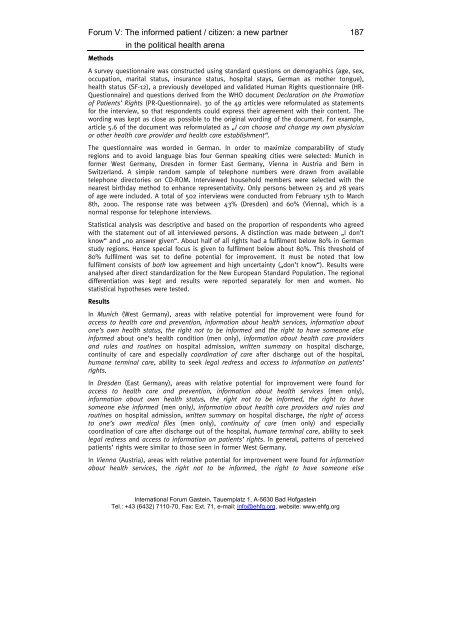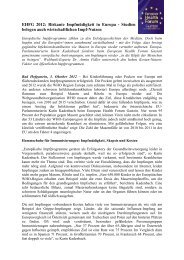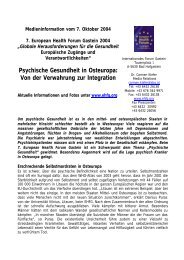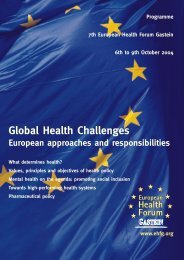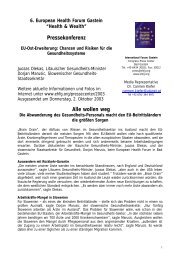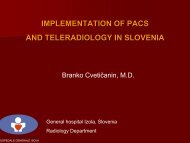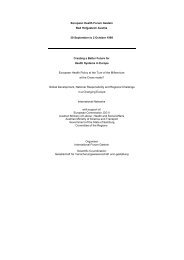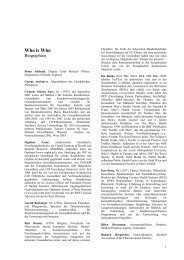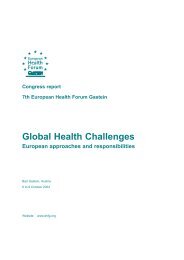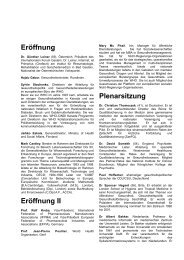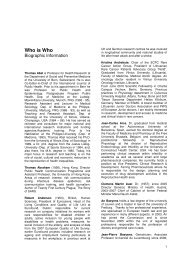Congress report - European Health Forum Gastein
Congress report - European Health Forum Gastein
Congress report - European Health Forum Gastein
You also want an ePaper? Increase the reach of your titles
YUMPU automatically turns print PDFs into web optimized ePapers that Google loves.
<strong>Forum</strong> V: The informed patient / citizen: a new partner<br />
in the political health arena<br />
Methods<br />
A survey questionnaire was constructed using standard questions on demographics (age, sex,<br />
occupation, marital status, insurance status, hospital stays, German as mother tongue),<br />
health status (SF-12), a previously developed and validated Human Rights questionnaire (HR-<br />
Questionnaire) and questions derived from the WHO document Declaration on the Promotion<br />
of Patients’ Rights (PR-Questionnaire). 30 of the 49 articles were reformulated as statements<br />
for the interview, so that respondents could express their agreement with their content. The<br />
wording was kept as close as possible to the original wording of the document. For example,<br />
article 5.6 of the document was reformulated as „I can choose and change my own physician<br />
or other health care provider and health care establishment“.<br />
The questionnaire was worded in German. In order to maximize comparability of study<br />
regions and to avoid language bias four German speaking cities were selected: Munich in<br />
former West Germany, Dresden in former East Germany, Vienna in Austria and Bern in<br />
Switzerland. A simple random sample of telephone numbers were drawn from available<br />
telephone directories on CD-ROM. Interviewed household members were selected with the<br />
nearest birthday method to enhance representativity. Only persons between 25 and 78 years<br />
of age were included. A total of 502 interviews were conducted from February 15th to March<br />
8th, 2000. The response rate was between 43% (Dresden) and 60% (Vienna), which is a<br />
normal response for telephone interviews.<br />
Statistical analysis was descriptive and based on the proportion of respondents who agreed<br />
with the statement out of all interviewed persons. A distinction was made between „I don’t<br />
know“ and „no answer given“. About half of all rights had a fulfilment below 80% in German<br />
study regions. Hence special focus is given to fulfilment below about 80%. This threshold of<br />
80% fulfilment was set to define potential for improvement. It must be noted that low<br />
fulfilment consists of both low agreement and high uncertainty („don’t know“). Results were<br />
analysed after direct standardization for the New <strong>European</strong> Standard Population. The regional<br />
differentiation was kept and results were <strong>report</strong>ed separately for men and women. No<br />
statistical hypotheses were tested.<br />
Results<br />
In Munich (West Germany), areas with relative potential for improvement were found for<br />
access to health care and prevention, information about health services, information about<br />
one’s own health status, the right not to be informed and the right to have someone else<br />
informed about one’s health condition (men only), information about health care providers<br />
and rules and routines on hospital admission, written summary on hospital discharge,<br />
continuity of care and especially coordination of care after discharge out of the hospital,<br />
humane terminal care, ability to seek legal redress and access to information on patients’<br />
rights.<br />
In Dresden (East Germany), areas with relative potential for improvement were found for<br />
access to health care and prevention, information about health services (men only),<br />
information about own health status, the right not to be informed, the right to have<br />
someone else informed (men only), information about health care providers and rules and<br />
routines on hospital admission, written summary on hospital discharge, the right of access<br />
to one’s own medical files (men only), continuity of care (men only) and especially<br />
coordination of care after discharge out of the hospital, humane terminal care, ability to seek<br />
legal redress and access to information on patients’ rights. In general, patterns of perceived<br />
patients’ rights were similar to those seen in former West Germany.<br />
In Vienna (Austria), areas with relative potential for improvement were found for information<br />
about health services, the right not to be informed, the right to have someone else<br />
International <strong>Forum</strong> <strong>Gastein</strong>, Tauernplatz 1, A-5630 Bad Hofgastein<br />
Tel.: +43 (6432) 7110-70, Fax: Ext. 71, e-mail: info@ehfg.org, website: www.ehfg.org<br />
187


